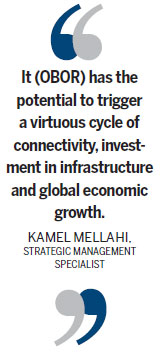Initiative to facilitate regional integration
Updated: 2015-10-30 07:33
By Cecily Liu in Madrid(China Daily Europe)
|
|||||||||||
China's One Belt One Road Initiative will be a strong factor in leading the world out of economic recession, especially through facilitating regional integration and coordinating much needed infrastructure investment, says political leaders and analysts.
They were speaking at Silk Road Forum, which was held on Oct 27 and 28 in Madrid, and followed the inaugural forum in Istanbul in December.
Izumi Nakamitsu, assistant secretary-general of the United Nations Development Programme, says that the new major funding initiatives associated with the OBOR policy, including the Asian Infrastructure Investment Bank, the New Development Bank and Silk Road Fund, show great potential for furthering financing development.
Nakamitsu says it's important that infrastructure investments related to the OBOR initiative are integrated into the national economic development plans of the countries involved, and that all the partners can leverage their comparative advantage in the cooperation process.
China's OBOR initiative, proposed by President Xi Jinping when he visited Central and Southeast Asia in 2013, consists of the Silk Road Economic Belt and the 21st Century Maritime Silk Road.
To achieve this integration, China has already deployed funds totaling around $100 billion, consisting of $40 billion for the Central Asia-focused Silk Road Fund, $50 billion for a new Asian Infrastructure Investment Bank, and $10 billion to the BRICS-led New Development Bank.

The OBOR policy is seen as central to the creation of the China-led Asian Infrastructure Investment Bank, a new international financial institution that seeks to work with the private sector to channel more funding into infrastructure investments.
"China's OBOR policy, together with AIIB strategy, can be viewed as a fundamentally creative platform to stimulate Asian and European economies, particularly through exporting China's capital," says Zhang Ying, associate dean of the Rotterdam School of Management at Erasmus University.
"For those countries along the OBOR that also participated in AIIB as a member, sectors with competitive advantage from each country can be recomposed and applied," Zhang says.
Vuk Jeremic, president of the Center for International Relations and Sustainable Development, adds that building a cultural understanding between countries along the OBOR focus is very important to ensure economic success of the policy.
Without knowing the people, being aware of the historical ties, and the cultural differences between different countries, it would not be possible to fully capture the benefits of newly built infrastructure, Jeremic says.
Kamel Mellahi, a professor of strategic management at Warwick Business School, says that he sees the OBOR policy as a growth-increasing initiative. "It has the potential to trigger a virtuous cycle of connectivity, investment in infrastructure and global economic growth.
"It has the potential to support the world economic recovery by improving among other things the transport and communication network between a number of important economic players, thereby improving the capacity for these economies to grow and prosper," Mellahi says.
Many countries are already starting to prepare for more participation in the OBOR strategy.
Alan Barrell, a professor and entrepreneur in residence at the Judge Business School at the University of Cambridge, says that Cambridge's business and academic community is already planning to work with Chinese investor-partners to bring much needed investment finance to established companies, especially in health care, life sciences and agriculture.
Jaime Garcia-Legaz Ponce, secretary of state for trade of Spain, said that there are many concrete benefits that Spanish firms can derive from participating in the OBOR strategy, especially in participating in the infrastructure constructing process.
(China Daily European Weekly 10/30/2015 page19)
Today's Top News
China to allow two children for all couples
China's central bank dismisses QE rumor
Chinese premier holds talks with German chancellor
Refugee crisis continues to create rift between pro-Europeans, Eurosceptics
Rescue operations continue in quake-stricken Afghan provinces
Dutch King receives Dutch rabbit with Chinese characteristics
Silk Road Fund to invest $100m in China International Capital Corp's IPO
Over 200 dead as huge earthquake shakes S. Asia
Hot Topics
Lunar probe , China growth forecasts, Emission rules get tougher, China seen through 'colored lens', International board,
Editor's Picks

|

|

|

|

|

|






